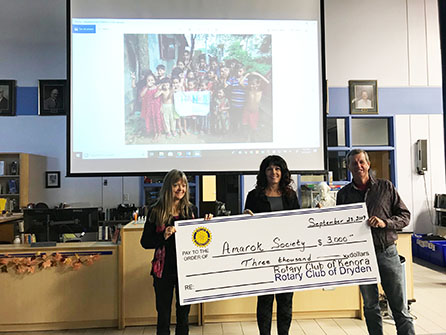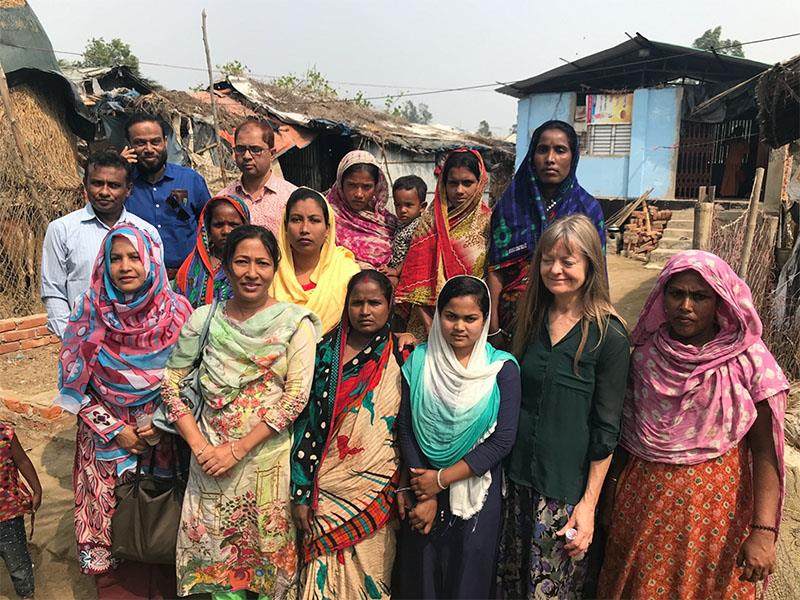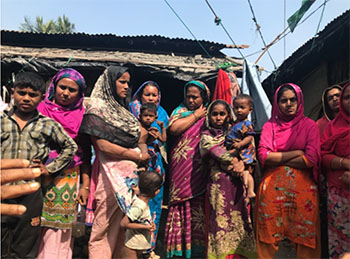
Editor’s Note: The following was written by Tanyss Munroe as a report to the Rotary Club of Dryden, ON to demonstrate how the Rotary Clubs of Cox’s Bazar were contributing “Time, Energy and Effort” instead of dollars to the school they were funding.
With the help of Anwar Sadat, a Rotarian of the East York Rotary Club, we were introduced to 3 Rotary Clubs in the city of Cox’s Bazar, just beside the world’s largest refugee camp (Rohingya). The people in the slum of 8,000 people where your school is, live in far worse conditions than those in the refugee camp.

The photo above is a number of the mothers in this school, the new teacher (to the left of Tanyss) and Rotarians on the left – 2 in the front row, 1 in the middle, 2 in the back row.
At first, they were wary of going to school. Was it safe? What was education? Should we trust you? We don’t know anyone with an education. And because these mothers all decided to attend the new school and commit to teaching 5 children, their future is now much brighter than they could have imagined.
Early in 2019, Tanyss Munro (co-founder, director) worked Amarok’s senior staff and the 3 Rotary Clubs to establish 3 new schools.
Rotarians found the best locations, they negotiated rent and were partners in hiring new teachers. They continue to play an important role in being only a phone call and short drive away from the teachers who sometimes need that advice or support. Every month a small group of Rotarians visit the schools to see the progress and help to sort out any challenges. Our senior staff, located in two other cities – Dhaka and Khulna – are in regular contact with these Rotarians and relationships are deepening.
 The first lesson for the 25 mothers in the Cox’s Bazar Dryden Women’s School was how to hold a pencil. The second lesson was which end goes to paper. Many were there against the wishes of husbands, in-laws and parents. Most women thought they wouldn’t be able to learn, but they were willing to try for the sake of the 5 neighbourhood children they could teach.
The first lesson for the 25 mothers in the Cox’s Bazar Dryden Women’s School was how to hold a pencil. The second lesson was which end goes to paper. Many were there against the wishes of husbands, in-laws and parents. Most women thought they wouldn’t be able to learn, but they were willing to try for the sake of the 5 neighbourhood children they could teach.The third lesson was practiced throughout the week and is so automatic to the youngest Canadian child we have difficulty imagining it must be learned. It’s fairly simple: that paper must be on a flat surface in order to write on it. Writing on a paper while it is being held aloft in the air doesn’t work. That’s the level of illiteracy – complete unfamiliarity with written words, letters and numerals. They also discovered during that first wonderful week that school is a safe place, that they are able to learn and that they’re surrounded by friends who will only grow closer to them.
Over the year these mothers have not only gained some literacy in Bengali, English and math, they have learned how to really think: cause and effect; prediction; patterns; simple analysis. And they’ve transformed from being overlooked beasts of burden (cooking, having babies, cleaning), to women who help others, who voluntarily teach 5 children, whose advise is actually sought by neighbours. They stand up for themselves and for others as they learn about human rights through songs, discussions and stories. And by teaching 5 children each, they’re giving girls and boys without hope of education a chance to open doors they didn’t know were there.
As a result, they’re quickly changing entrenched attitudes of what’s possible for women and girls. All of this was unthinkable before the school opened.